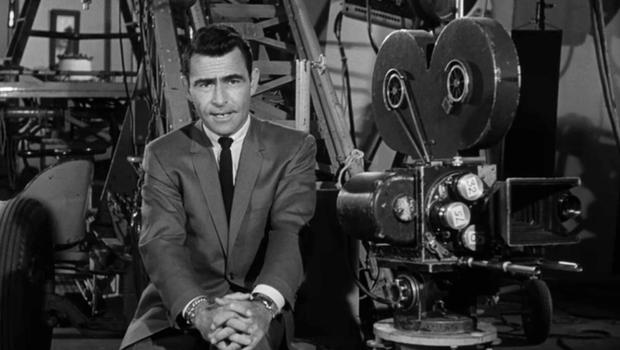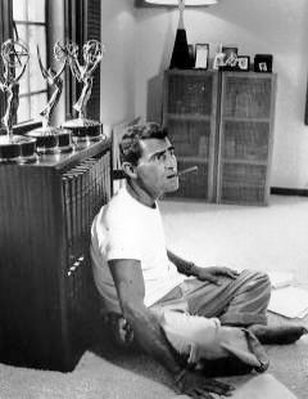|
Rod Serling is one of my favorite writers. While he is still no doubt best known as the creator and host of the CBS television series, The Twilight Zone (1959-1964), he has produced a body of work that goes far beyond the scope of that series, with much greater depth, than most people are aware today – that is, for those who even remember him. Born in Syracuse, New York on Christmas Day in 1924 to a Jewish family (but later converting to Unitarianism), he spent most of his youth 70 miles to the south in Binghamton, when his parents moved there in 1926. This apparently was a most idyllic time of his life, as he reminisces upon this period as a golden, innocent age in America, time and time again in his writings. After graduating high school in 1943, he enlisted in the Army Air Force, in the 511th Parachute Infantry Regiment of the 11th Airborne Division. After undergoing basic training in Camp Toccoa in Georgia, his division shipped out to New Guinea, ultimately seeing action in the Philippines and was part of the occupation force in Japan. He saw death around virtually every single day during his tour-of-duty in the Pacific. He was wounded twice in the Philippines, and was awarded the Purple Heart, Bronze Star and the Philippine Liberation Medal. But despite his distinguished service, the war in the Pacific left an indelible mark on him – shaping his political views and writing (as well as leaving him with flashbacks and nightmares) for the rest of his life. Once discharged from the Army in 1946, and after a period of recuperation, he enrolled in Antioch College in Yellow Springs, Ohio where he ultimately studied theater, broadcasting and majored in Literature, graduating in 1950 – pretty much at the dawn of the Television Age. Rod Serling’s true skill as a writer, in my opinion, was as a dramatist. As actor Jack Klugman once opined – he had a marvelous way of using words in terms of phrasing dialogue. The dialogue he wrote was always natural, poignant and virtually rolled off the actor’s tongue. He had a tremendous empathy in his writing for the downtrodden, oppressed, and poor in spirit. In that regard, his writing reminds me very much of John Steinbeck.
In the 1950s, many television dramas were actually broadcast live. This is the first television drama where the critical and popular acclaim was so great, that the performance was repeated – but it actually had to be performed and broadcast again as a separate performance, because it was live! Ironically, the theme here was not too dissimilar from Rod Serling’s last great teleplay of his career, “They’re Tearing Down Tim Riley’s Bar.” Here, he has come full-circle – from the ‘newcomer’ in, “Patterns,” to the tired, lonely businessman getting pushed out, only 16 years later in, “They’re Tearing Down Tim Riley’s Bar.” [2] Subsequent to his success with, “Patterns,” in 1955, he wrote a number of award-winning, outstanding teleplays and screenplays, including: “Requiem for a Heavyweight” Playhouse 90 (1956); “The Comedian” Playhouse 90 (1957); “A Town Has Turned to Dust” Playhouse 90 (1958); “Seven Days in May” (1964); “Planet of the Apes” (co-written with Michael Wilson) (1968); and of course, many of The Twilight Zone and Night Gallery episodes. And this brings us to, “They’re Tearing Down Tim Riley’s Bar.” [3] Night Gallery Season 1, Episode 6 - "They're Tearing Down Time Riley's Bar" Teleplay by Rod Serling © 1971 MCA-Universal. All Rights Reserved Reproduced here for editorial and review purposes only. Given the importance of the cocktail bar as an institution of Social Interaction and as a principal venue for facilitating the pursuit of flanerie - a tenet established by this website - it is perhaps not too surprising that this story would revolve around the demolition of a bar that, in reality is the only physical remnant remaining of the precious memories of those long departed and cherished by the protagonist.
Not too unlike the madeleine that Marcel Proust dipped into his tea, which brought back the flood of memories resulting in Remembrances of Things Past, I think. I saw this episode when it was originally telecast on a Wednesday night, January 20, 1971. I was just 17 years old. And I was struck, and somewhat puzzled, by the pathos that it evoked in me, even as an adolescent. How could such a story have so profound an impact on a young man who would have never yet experienced any of these things? Perhaps some of the reason was simply due to the quality of the writing in this episode, which was nominated for an Emmy Award in 1971, along with the brilliant performance of actor William Windom as Randy Lane. But I also believe that I somehow innately knew (or perhaps feared) that much of the emotion and experience on display in this episode would be mine to experience in real life as an old man. And to a degree, it has. I now know why old men drink! It's quite fascinating to see as well how much of the modern human experience remains consistent from one generation to the next. And so now, 46 years later, I too, like Rod Serling, find myself also coming full-circle, with even more empathy for the protagonist – because I now understand completely much of his experience – particularly in the workplace. And while I’m blessed with a beautiful wife for which I cannot express enough thanks and gratitude, so many in my life who have meant so much to me, are now just simply gone. But their spirits touch me, everyday. And I think about them and I miss them, everyday. The ending for me however, will not be the same as the ending for Randolph Lane in the episode above. At age 62, I have truly come to the end of the road – at least in a corporate environment. For me, there will be no, “…next 25 years.” And that's quite okay. The real question to be asked is, "What's next?" For me, as I have consistently established in this website and blog, the only credible answer is to pursue the life of a flâneur – continually meeting new people through humble Social Interaction; enjoying and caring for the true friends I have; and savoring all of what life has to offer. And that is what we shall begin doing here. _____________________________________________ [1] Internet Movie Database (IMDB), “Patterns,” Kraft Television Theater [2] Gordon F. Sander, Serling: The Rise and Twilight of Television's Last Angry Man (New York: Penguin Books, 1994), 212. [3] © 1971 MCA-Universal. All Rights Reserved. Episode made available here for editorial and review purposes only. No copyright infringement is intended. © 2017 David Nogar All Rights Reserved
1 Comment
|
Author
David Nogar worked in railroad operations for almost 50 years until retiring from the transportation business in early 2023.
|


 RSS Feed
RSS Feed